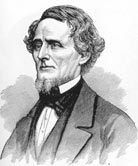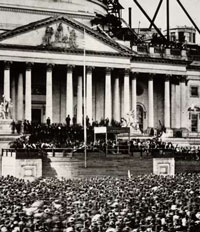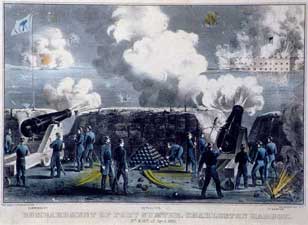| 1860 |
| xxx |
November
6, 1860 |
Abraham
Lincoln elected President of the United States. |
| |
December
20, 1860 |
 South
Carolina secedes. South
Carolina secedes. |
| |
December
24, 1860 |
"Declaration
of the Immediate Causes which Induce and Justify the Secession
of South Carolina" |
| |
|
"[A]n
increasing hostility on the part of the non-slaveholding States
to the institution of slavery, has led to a disregard of their
obligations, and the laws of the General Government have ceased
to effect the objects of the Constitution... Government cannot
endure permanently half slave, half free." |
| |
|
|
| 1861 |
| |
January
9, 1861 |
 Mississippi
secedes Mississippi
secedes |
| |
|
"A
Declaration of the Immediate Causes which Induce and Justify
the Secession of the State of Mississippi from the Federal
Union." |
| |
|
Before
Georgia seceded, Mississippi sent its commissioner, William
L. Harris, to the Georgia Legislature.
He
decried the threat of Lincoln and the Republicans and told
the members that they had to choose between "This new
union with Lincoln Black Republicans and free Negroes, without
slavery; or, slavery under our old constitutional bond of
union, without Lincoln Black Republicans, or free Negroes
either, to molest us." |
| |
January
10, 1861 |
 Florida
secedes from the Union. Florida
secedes from the Union. |
| |
|
Florida did not write a declaration. |
| |
|
|
| |
January
11, 1861 |
 Alabama
secedes from the Union. Alabama
secedes from the Union. |
| |
|
Alabama
Commissioner Stephen Fowler Hale failed in his effort to
convince Kentucky to secede, but wrote to the governor a
diatribe against Northern attacks on slavery and lamented
that Lincoln's election was "nothing less than
an open declaration of war, for the triumph of this new
theory of government destroys the property of the South,
lays waste her fields, and inaugurates all the horrors of
a Santo Domingo servile resurrection...."
"Whereas,
the election of Abraham Lincoln and Hannibal Hamlin to the
offices of President and Vice-President of the United States
of America by a sectional party avowedly hostile to the
domestic institutions and to the peace and security of the
State of Alabama, preceded by many and dangerous infractions
of the Constitution of the United States by many of the
States and people of the Northern section, is a political
wrong of so insulting and menacing a character as to justify
the people of the State of Alabama in the adoption of prompt
and decided measures for their future peace and security." |
| |
January
19, 1861 |
 Georgia
secedes from the Union. Georgia
secedes from the Union. |
| |
|
"Declaration
of the Causes of Secession, Georgia" |
| |
|
"The
prohibition of slavery in the Territories is the cardinal
principle of [the Republicans]," and that "by their
declared principles and policy they have outlawed $3,000,000,000
of our property in the common territories of the Union."
|
| |
January
26, 1861 |
 Louisiana
secedes from the Union. Louisiana
secedes from the Union. |
| |
|
Commissioner
George Williamson George Williamson to the Texas Secession
Convention on March 9, 1861:
"Being
desirous of obtaining the concurrence of the people of Texas
in what she has done, Louisiana invites you to a candid
consideration of her acts in resuming the powers delegated
to the government of the late United States, and in providing
for the formation of a confederacy of "The States which
have seceded and may secede." ... She was impelled
to this action to preserve her honor, her safety, her property
and the free institutions so sacred to her people. She believed
the federal agent had betrayed her trust, had become the
facile instrument of a hostile people, and was usurping
despotic powers. She considered that the present vacillating
executive, on the 4th of March next, would be supplanted
by a stalwart fanatic of the Northwest, whose energetic
will, backed by the frenzied bigotry of unpatriotic masses,
would cause him to *establish* the military despotism already
inaugurated." |
| |
February
1, 1861 |
 Texas
secedes from the Union. Texas
secedes from the Union. |
| |
|
"A
Declaration of the Causes which Impel the State of Texas
to Secede from the Federal Union" |
| |
|
"We
hold as undeniable truths that the governments of the various
States, and of the confederacy itself, were established exclusively
by the white race, for themselves and their posterity; that
the African race had no agency in their establishment; that
they were rightfully held and regarded as an inferior and
dependent race, and in that condition only could their existence
in this country be rendered beneficial and tolerable." |
| |
February
4, 1861 |
Seceded
states held a Convention in Montgomery, Alabama. |
| |
February
8, 1861 |
Convention
adopted a Confederate Constitution. |
| |
February
9, 1861 |
Jefferson
Davis elected president of the Confederate States. |
| |
|
After
taking the oath of office as the Vice President of the Confederacy,
Alexander H. Stephens, a former Congressman from Georgia,
stated that:

"Our
new government is founded on the opposite idea of the equality
of the races . . . Its corner stone rests upon the great
truth that the Negro is not equal to the white man. This
. . . government is the first in the history of the world,
based on this great physical and moral truth." |
| |
March
4, 1861 |
Lincoln's
Inauguration. |
| |
|
 At
Lincoln's inauguration the new president said he had no plans
to end slavery in those states where it already existed, but
he also said he would not accept secession. He hoped to resolve
the national crisis without warfare. At
Lincoln's inauguration the new president said he had no plans
to end slavery in those states where it already existed, but
he also said he would not accept secession. He hoped to resolve
the national crisis without warfare. |
| |
March
9, 1861 |
Address
of George Williamson to the Texas Secession Convention |
| |
March
11, 1861 |
Confederate
Constitution |
| |
April
12, 1861 |

Attack
on Fort Sumter - the opening engagement of the American
Civil War.
This
attack prompted four more states to join the Confederacy. |
| |
April
17, 1861 |
 Virginia
secedes from the Union. Virginia
secedes from the Union. |
| |
|
With
Virginia's secession, Richmond was named the Confederate capitol.
|
| |
May
6, 1861 |
 Arkansas
secedes from the Union. Arkansas
secedes from the Union. |
| |
May
6, 1861 |
 Tennessee
secedes from the Union. Tennessee
secedes from the Union. |
| |
May
21, 1861 |
 North
Carolina secedes from the Union. North
Carolina secedes from the Union. |
| |
June,
1861 |
West
Virginia is created. |
| |
|
 Residents
of the western counties of Virginia did not wish to secede
along with the rest of the state. This section of Virginia
was admitted into the Union as the state of West Virginia
on June 20, 1863. Residents
of the western counties of Virginia did not wish to secede
along with the rest of the state. This section of Virginia
was admitted into the Union as the state of West Virginia
on June 20, 1863. |
| |
June,
1861 |
Four
Slave States Stay in the Union. |
| |
|
Despite
their acceptance of slavery, Delaware, Kentucky, Maryland,
and Missouri did not join the Confederacy.
Although divided in their loyalties, a combination of political
maneuvering and Union military pressure kept these states
from seceding. |
| |
August
16, 1861 |
Confederate
states declared to be in a state of insurrection by President
Lincoln. |
| |
|
|
| |
|
|
